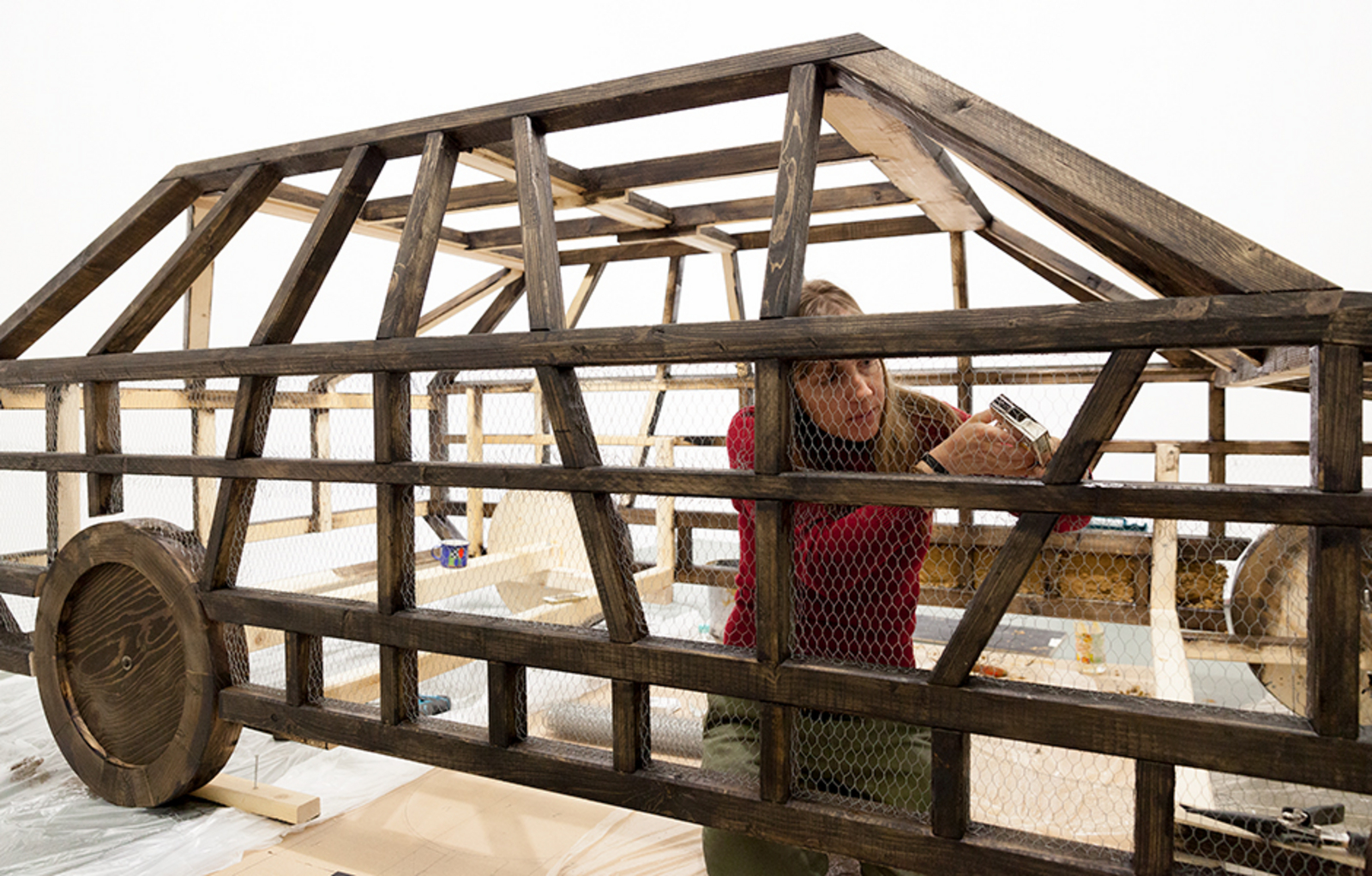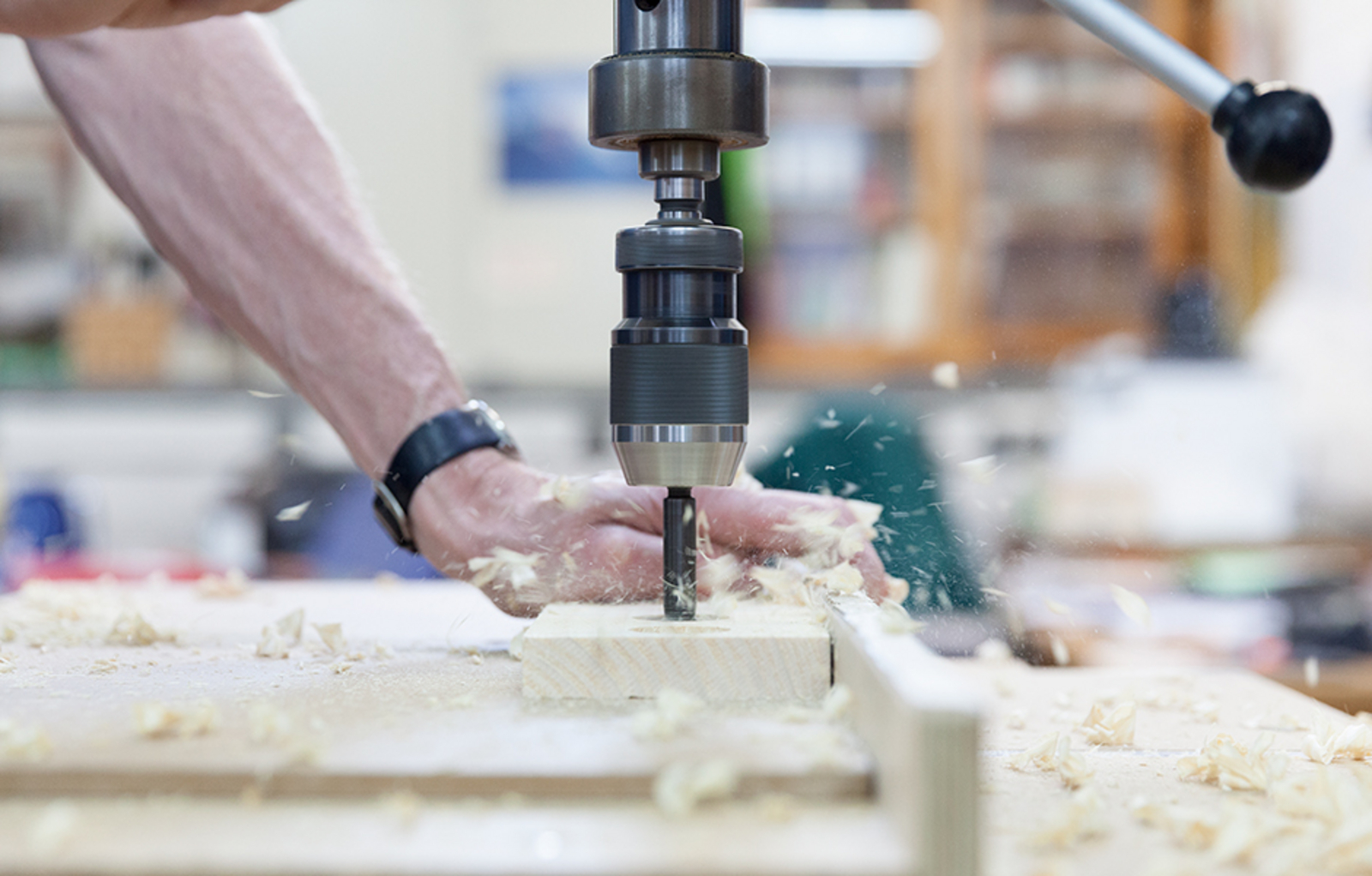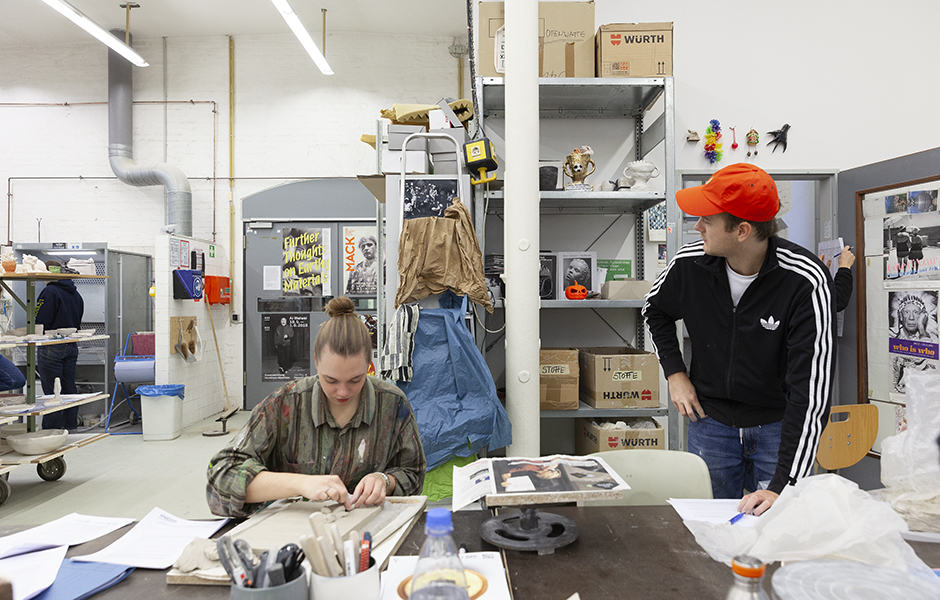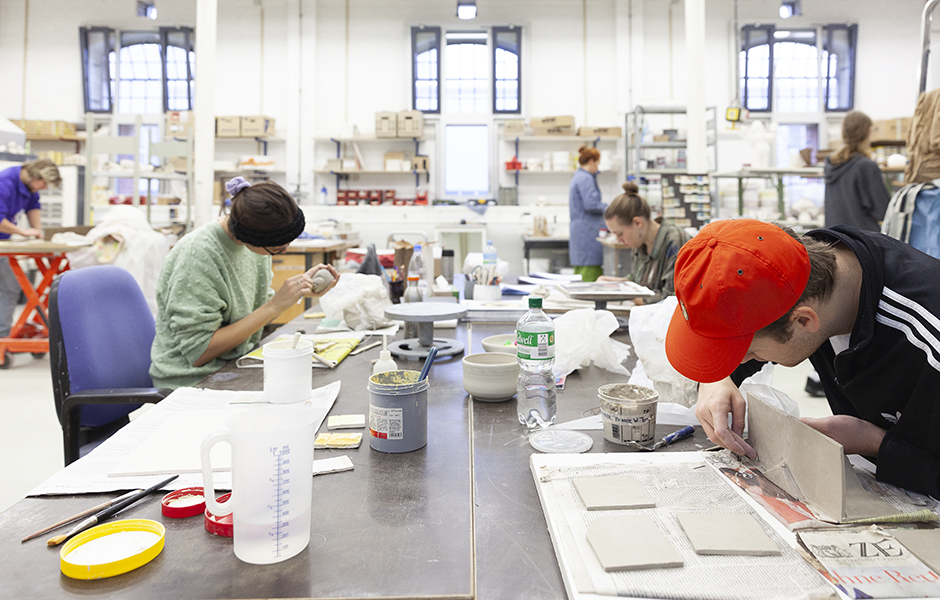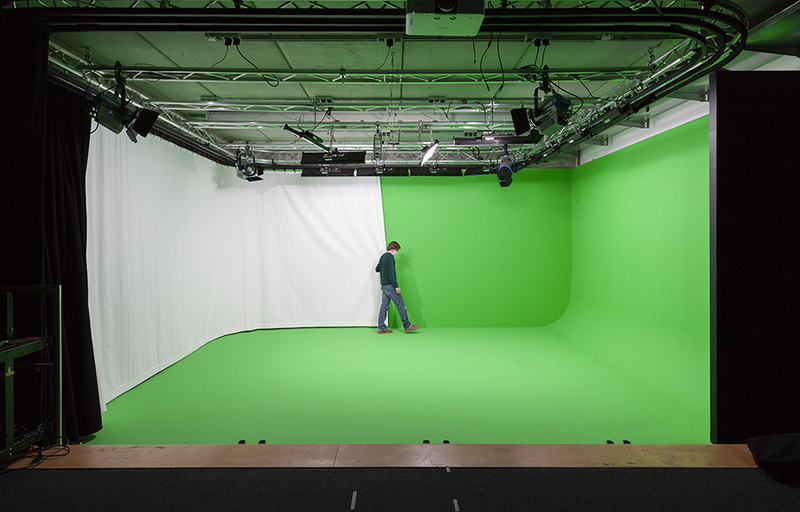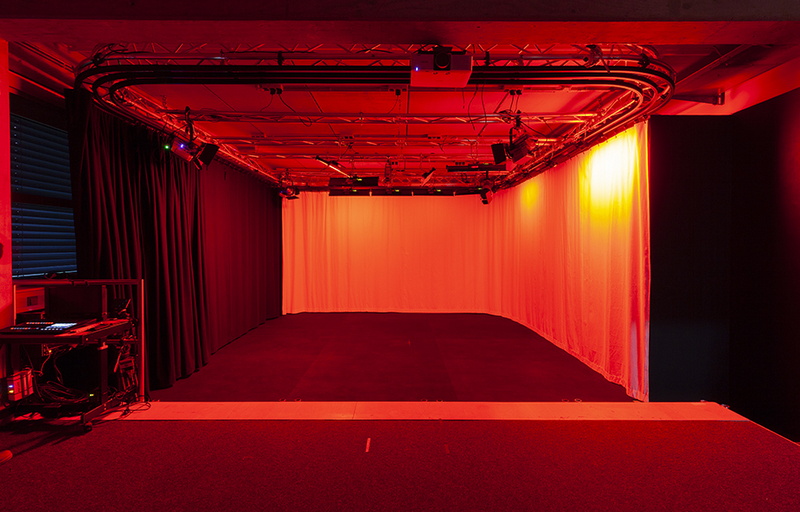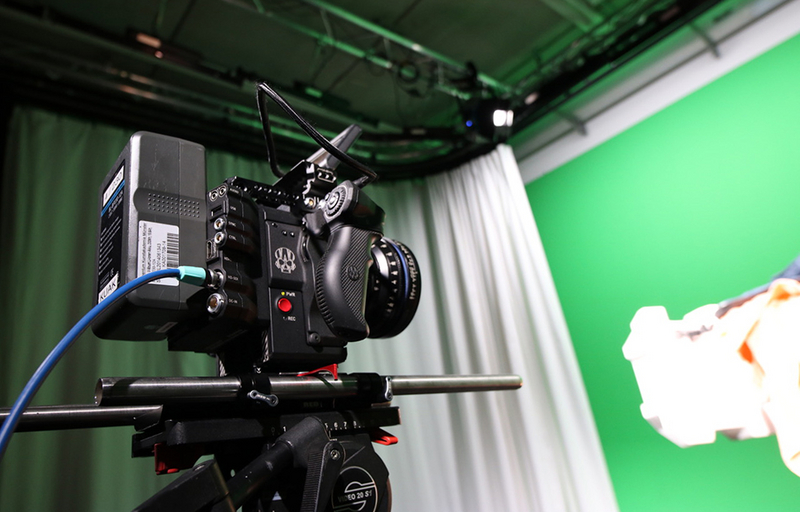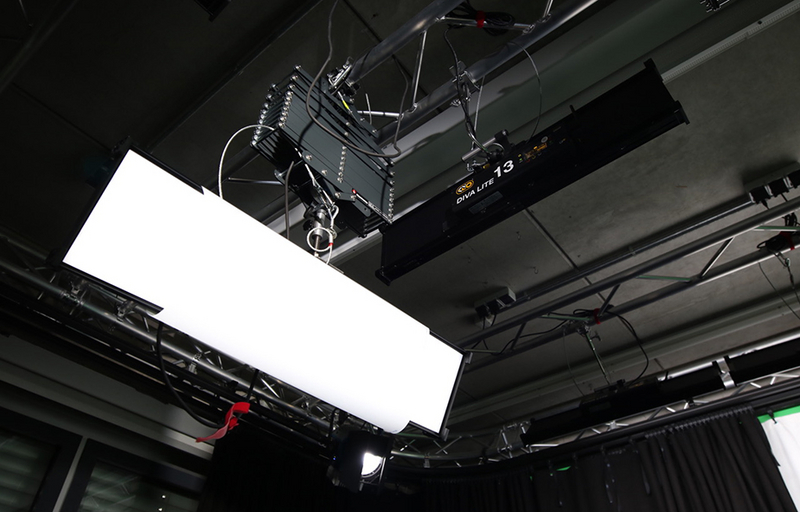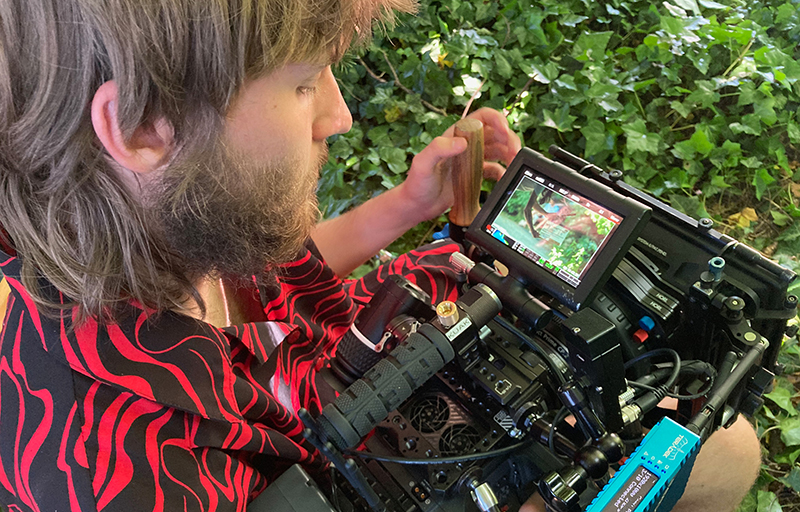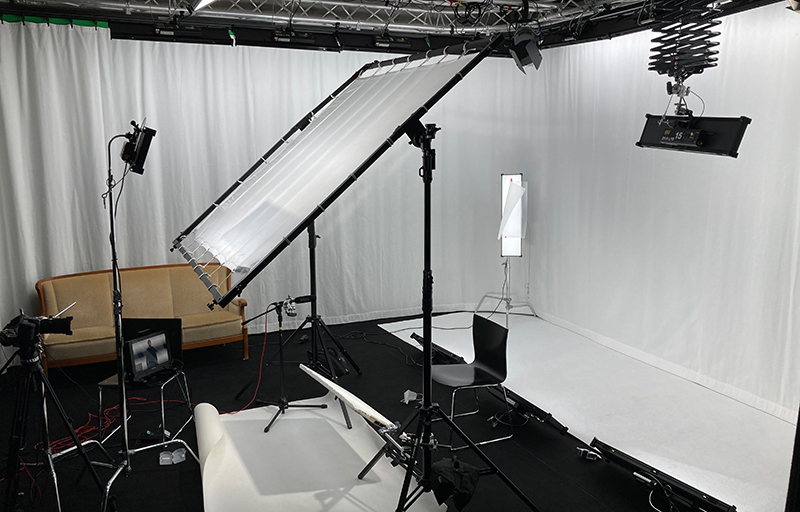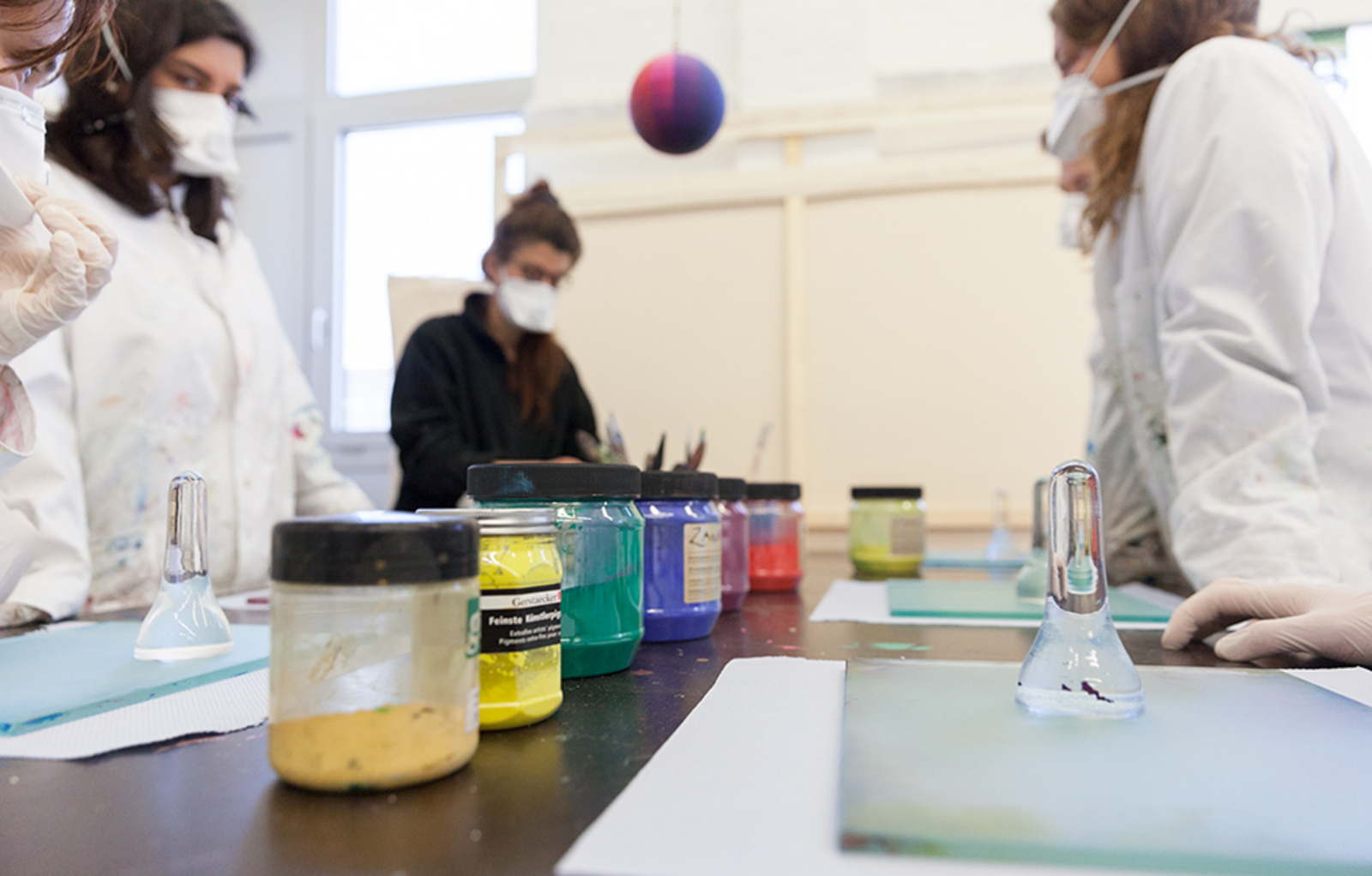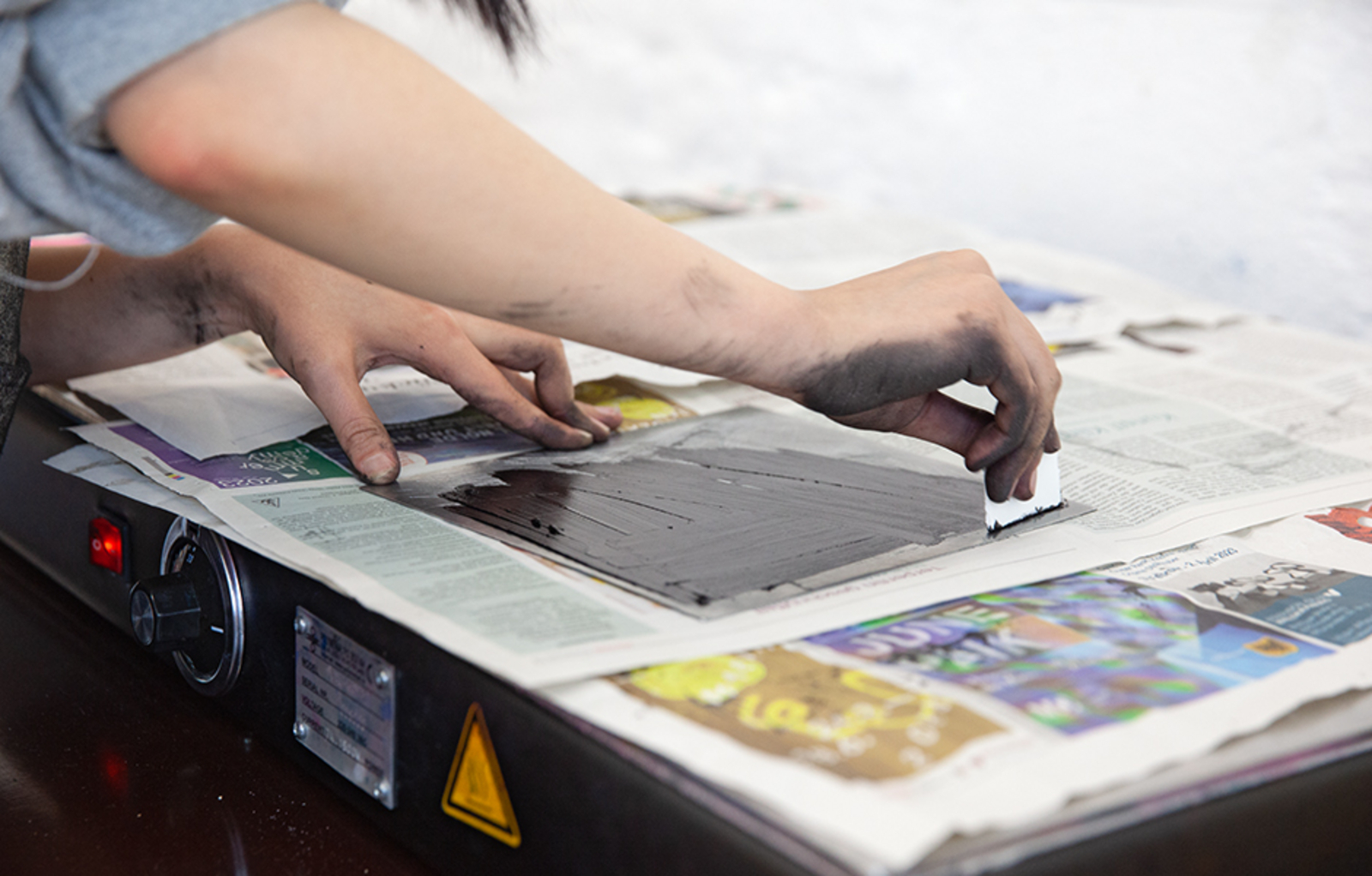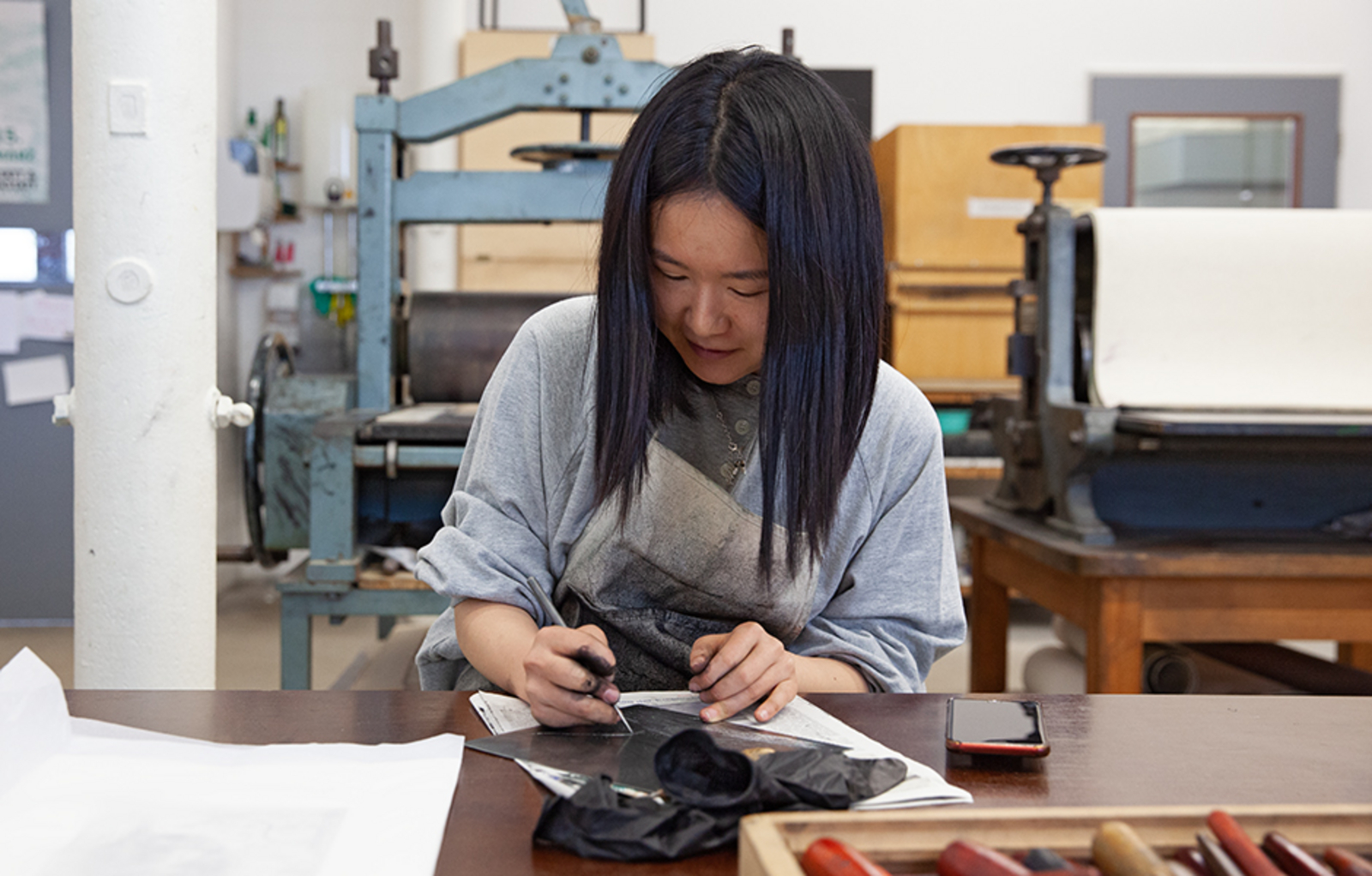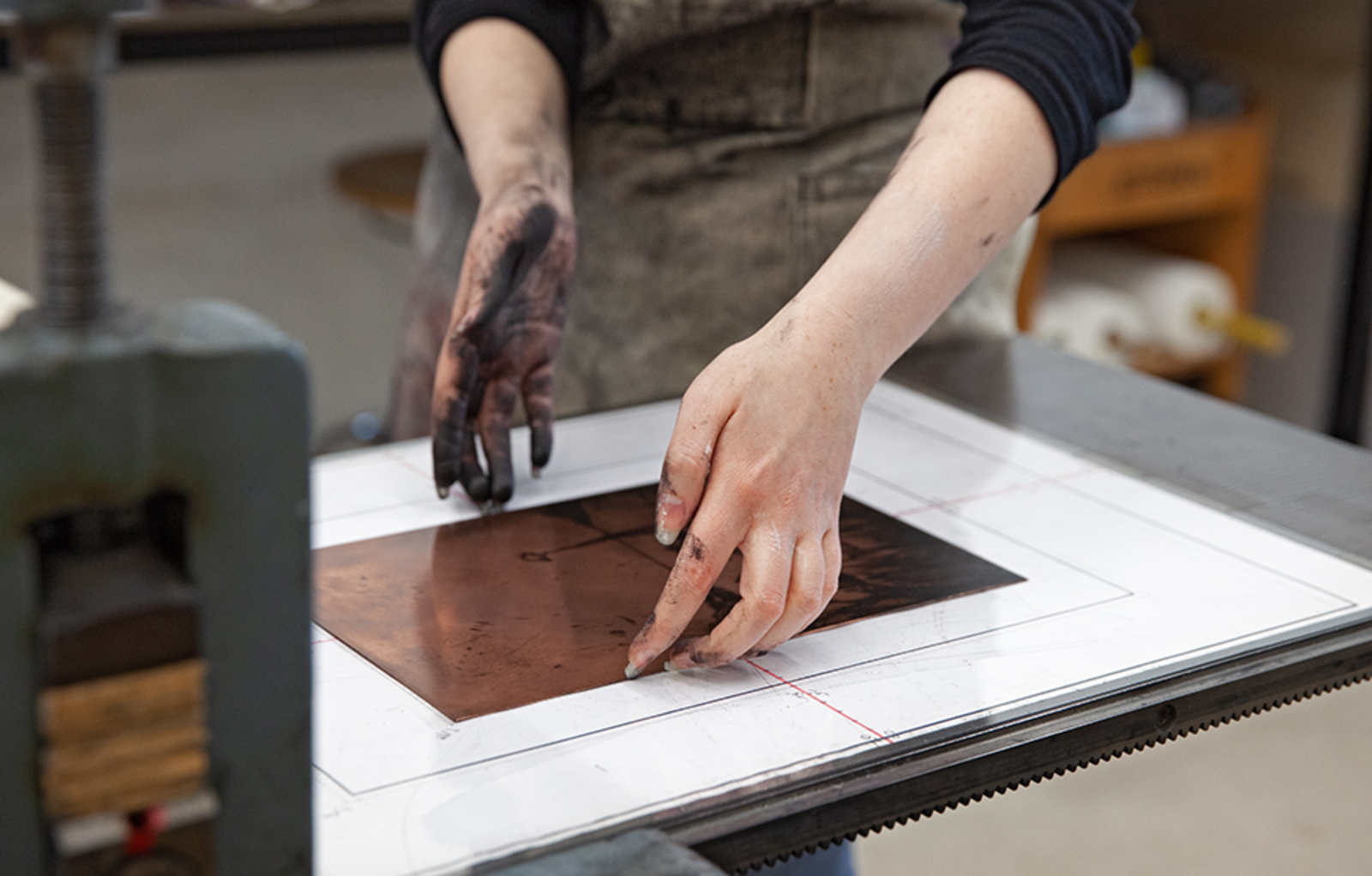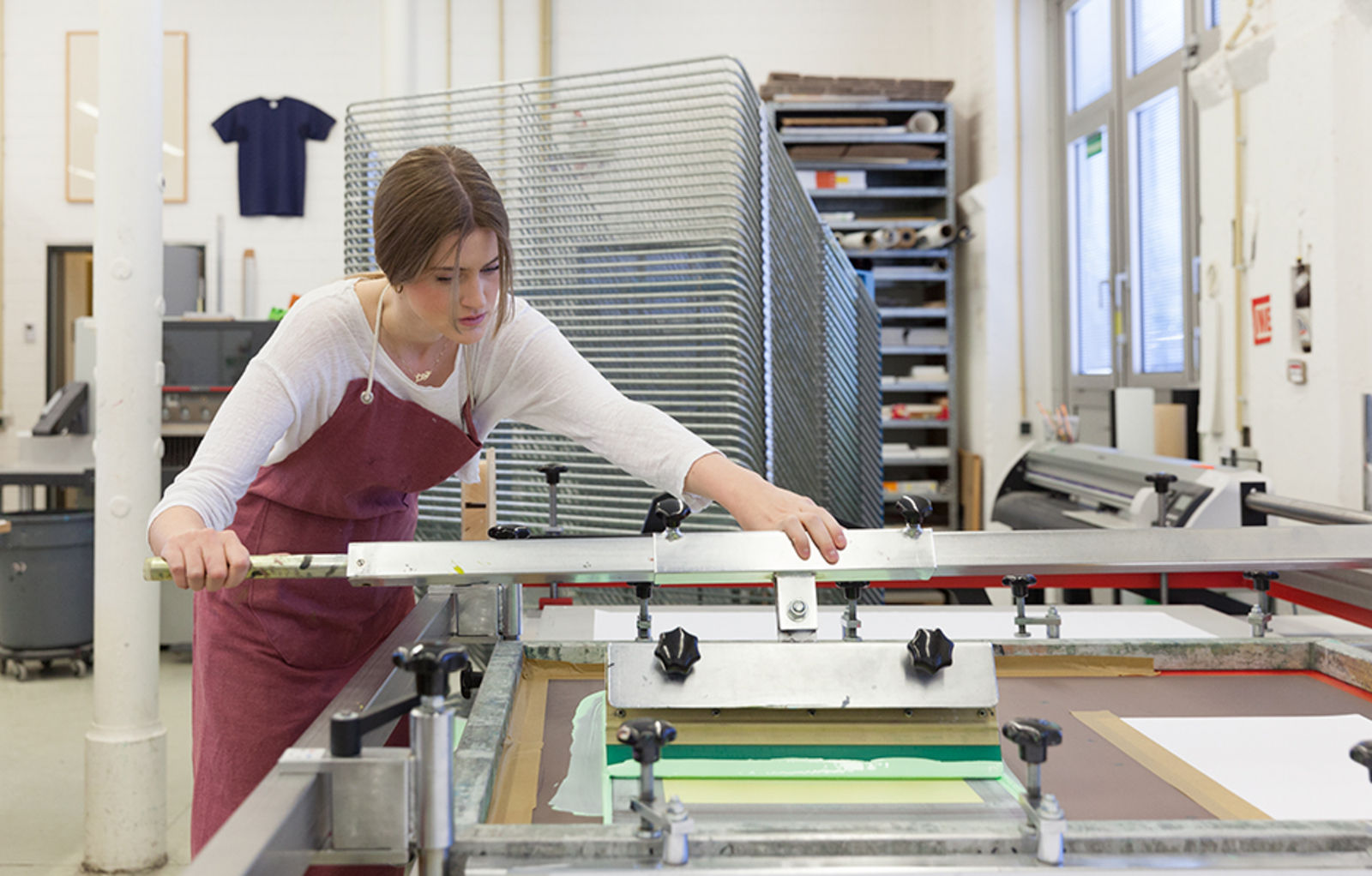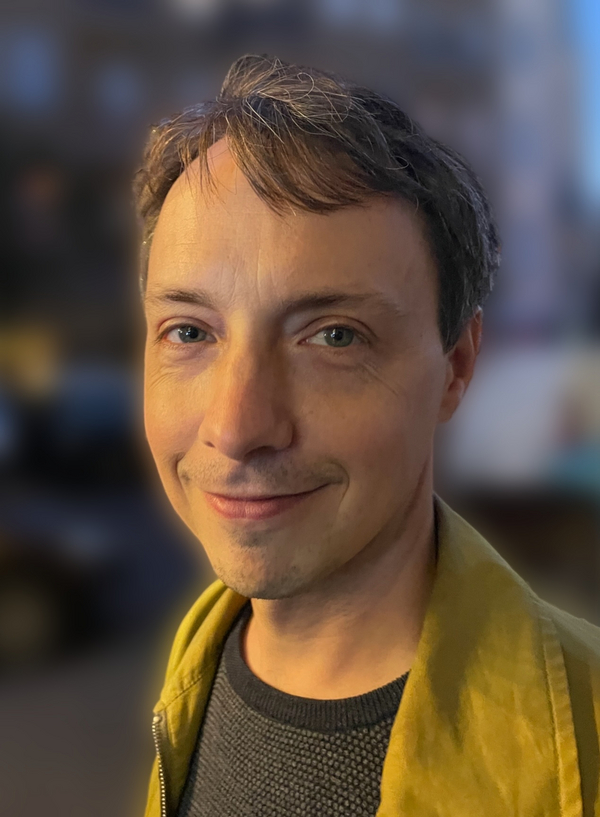The library was opened in 2001 as a joint library of the University of Fine Arts and the Muenster School of Architecture at FH Münster – University of Applied Sciences. With the establishment of the Muenster School of Design on the Leonardo Campus in 2009 and the associated growth in library holdings, an extension of the building became necessary. The extension was planned and realised by the student working group “zauberscho(e)n” under the direction of Prof. Herbert Bühler (FH Münster).
The collection focuses on contemporary art. The collection in the area of art education/art didactics has recently been greatly expanded.
The library is equipped with:
- 8 Internet workstations
- Scanners for documents up to DIN A3
- 3 working boots (for use on a daily basis, no advance reservation possible)
- Colour copiers with the option to scan and print from a USB stick
- Return box (return option outside opening hours)
A special feature is the online material library. Over 600 different materials are listed here with information on their origin, appearance, specific properties and areas of application.
Further information:
Stefan Riegelmeyer
Artistic-technical teacher: Wood / Academic Staff Council
Ph. +49 251 83 61083
riegelmeyer[at]kunstakademie-muenster.de
Leonardo-Campus 2
Room 083
In the wood workshop, students learn about the properties of different types of wood and wood-based materials such as chipboard, MDF or plywood. They also learn which material is suitable for different applications and how to work wood with hand tools or with modern woodworking machines. For this purpose, students have access to an extensive selection of hand tools as well as modern machinery, including CNC milling machines. They also learn surface treatment with oils, wax or lacquers.
Verena Stieger
Artistic-technical teacher: Ceramics
Ph. +49 251 83 61078
stieger[at]kunstakademie-muenster.de
Leonardo Campus 2
Room 078
The ceramics and mould making workshops are closely linked.
The ceramics workshop provides the opportunity to work with different materials such as stoneware and porcelain, and thus various construction techniques with sculptural materials or serial production using the hand-casting method. Various firing processes and an introduction to glaze theory can be further learned and explored experimentally.
The affiliated mould making workshop deals mainly with plaster as a material. By making negative moulds, a positive can be moulded afterwards, e.g. with ceramic material, and created serially in this way. Furthermore, basic plaster moulding and impression techniques are taught so that students can use the material not only in mould making, but also as a direct material for a sculpture.
Malte Melms
Artistic-technical teacher: Synthetic materials, mould making /3D-Print
Ph. +49 251 83 61082
melms[at]kunstakademie-muenster.de
Leonardo-Campus 2
Room 081
The workshop for synthetic materials and mould making offers students the opportunity to realise projects from a wide variety of materials in almost all sizes. Basic techniques can be learned, such as the building of moulds and stabilising constructions, fibreglass laminate and solid casting. It is also taught how to handle the required materials safely and professionally. Depending on the application, a variety of materials such as silicone, polyester resin, epoxy resin, polyurethane and acrylic resins can be used.
Christoph Herchenbach
Artistic-technical teacher: Metal
Ph. +49 251 83 61081
herchenbach[at]kunstakademie-muenster.de
Leonardo-Campus 2
Room 081
In the metal workshop, students can learn various manual and mechanical techniques for metalworking so that they can later use them themselves. Various hand tools, a welding cabin, a forge and professional machinery, among other things, are available for this purpose. The properties of different metals and metal construction objects are taught as well. Whether sculptures made of scrap iron, kinetic art machines or auxiliary constructions for other media – the range of artistic-technical work in the metal workshop is multifaceted.
Michael Spengler
Artistic-technical teacher: Film / video / new media
Ph. +49 251 83 61012
spengler[at]kunstakademie-muenster.de
Leonardo-Campus 2
Room 011 E
Jürgen Waltermann
Techniques Film / Video / New Media
Ph. +49 251 83 61123
waltermann[at]kunstakademie-muenster.de
Leonardo-Campus 2
Room 123
Today, the technology for image and sound recording is developing at ever shorter intervals, which means that the possibilities for artistic expression in the field of new media are also constantly growing.
The workshop for film, video and new media offers students almost all technical possibilities for artistic development. One of the aims of teaching is therefore to support students in making a considered selection of the most suitable medium for their work from the wealth of technical options available. A wide range of digital cameras, lighting and sound equipment is available for the production and final presentation, which can be used to realize almost anything from very small projects to cinema films.
In addition to classic video works or narrative short and feature-length films, students also experiment with new formats such as VR (virtual reality), mixed / augmented reality or 360° video. But working with analog 8 and 16 mm film is also still possible. The workshop's offer is extended by specialized lecturers who offer courses on various topics such as animation, film design, VR or analogue film.
In addition to the technical equipment, there is a particular focus on the planning, implementation and finalization of individual projects. The workshop has its own film studio, five post-production workstations consisting of three editing rooms and a sound studio. Since 2025, the workshop has had a professional color grading area.
After successfully completing the relevant courses and introductions, students can use the respective workstations and the film studio independently and borrow equipment from the academy for their artistic work.
We are working hard on the new digital lending system. Please send your requests by e-mail to: equipmentverleih[at]kunstakademie-muenster.de
The opening hours of the lending desk are:
Mondays, 10:00 to 13:00
Thursdays, 13:00 to 16:00
During these times, the tutors can also be reached by telephone on 0251 83 61008.
Over more than 100 years of film history, production processes have been established that were considered set for a long time. The production process was clearly divided into pre-production, production and post-production, and it was also a matter of course that all the artistic trades on set worked together in close, even physically present, collaboration. This kind of producing was or still is mostly the case with larger film projects at the University of Fine Arts Münster as well.
Precisely these pillars were questioned and rethought from today’s technological perspective with the advent of Virtual Production (VP) in film and media production a few years ago. In VP, high-resolution 3D environments generated in real time in the studio are usually played on a huge LED wall, in front of which actors act in partly real sets. Ideally, the actual scene image merges seamlessly with the animated one in the background. If there is no LED wall available, a green screen works just as well, as in the case of our film studio. In this case, the green background is replaced in real time by the live rendered 3D environment, and the finished composed image can be recorded immediately.
The aim of the Virtual Production Lab is to explore the possibilities of VP for artistic creation and to realise various artistic projects, also those of an experimental nature. Spatial and physical obstacles are to be overcome in the design, and the VP technologies required for this are to be used and artistically reflected upon. The Virtual Production Lab aims to explore the extent to which this is possible with these digital tools or can be simulated, where technical limits have been reached or where technical problems still need to be solved, and to what extent these influence or condition the artistic creation of the resulting media-reflexive works.
The Virtual Production Lab is funded by the DigiFellows Programme/Digitale Hochschule NRW.
Interview with Michael Spengler (in German):
Over more than 100 years of film history, production processes have been established that were considered set for a long time. The production process was clearly divided into pre-production, production and post-production, and it was also a matter of course that all the artistic trades on set worked together in close, even physically present, collaboration. This kind of producing was or still is mostly the case with larger film projects at the University of Fine Arts Münster as well.
Precisely these pillars were questioned and rethought from today’s technological perspective with the advent of Virtual Production (VP) in film and media production a few years ago. In VP, high-resolution 3D environments generated in real time in the studio are usually played on a huge LED wall, in front of which actors act in partly real sets. Ideally, the actual scene image merges seamlessly with the animated one in the background. If there is no LED wall available, a green screen works just as well, as in the case of our film studio. In this case, the green background is replaced in real time by the live rendered 3D environment, and the finished composed image can be recorded immediately.
The aim of the Virtual Production Lab is to explore the possibilities of VP for artistic creation and to realise various artistic projects, also those of an experimental nature. Spatial and physical obstacles are to be overcome in the design, and the VP technologies required for this are to be used and artistically reflected upon. The Virtual Production Lab aims to explore the extent to which this is possible with these digital tools or can be simulated, where technical limits have been reached or where technical problems still need to be solved, and to what extent these influence or condition the artistic creation of the resulting media-reflexive works.
The Virtual Production Lab is funded by the DigiFellows Programme/Digitale Hochschule NRW.
Interview with Michael Spengler (in German):
Holger Krischke
Artistic-technical teacher: Photography
Ph. +49 251 83 61031
krischke[at]kunstakademie-muenster.de
Leonardo-Campus 2
Room 031
The photo workshop offers a wide range of courses to impart knowledge and application possibilities of digital and analogue photography. Everything is possible, from simple shots with self-made pinhole cameras to the latest digital composing techniques.
The photo workshop has a digital computer room, a large photo studio, an analogue photo lab and daylight rooms for further processing of photographic works. Both the digital and the analogue equipment in the photo area is state-of-the-art and is continuously being further developed.
Students may use the workshop rooms and equipment for their free project work. Cameras as well as a wide range of accessories can be borrowed at the photo counter. Students at the University of Fine Arts Münster thus have the opportunity to realise photographic art at the highest level.
Fairy von Lilienfeld
Artistic-technical teacher: Painting technique
Ph. +49 251 83 61075
lilienfe[at]kunstakademie-muenster.de
Leonardo-Campus 2
Room 075 A
In the painting technique workshop, students learn basic craft skills such as building a frame, stretching canvases or various priming techniques. It is also taught how to safely and professionally handle required chemicals such as solvents. The specific properties of different painting surfaces and different colours (e.g. oil paints, acrylic paints, varnishes) are also part of the teaching content, as is making one’s own colours.
Jenny Gonsior
Artistic-technical teacher: Etching
Ph. +49 251 83 61074
j.gonsior[at]kunstakademie-muenster.de
Leonardo-Campus 2
Room 074 B
The etching workshop provides extensive opportunities for work and experimentation. An introductory course teaches basic techniques and knowledge that are prerequisites for working freely in the workshop. Common intaglio printing (drypoint, line etching, aquatint, vernis mou) can be learned, as can, on request, letterpress printing (linocut and woodcut). In addition to the courses offered, supervision of artistic projects and advice on their technical feasibility is also possible.
The workshop has three printing presses available for etching (roller length 75 cm and 2 x 42 cm) plus a combination press (70 cm) for etching and woodcut/linocut.
Thomas Haubner
Artistic-technical teacher: Screen and digital printing
Ph. +49 251 83 61077
haubner[at]kunstakademie-muenster.de
Leonardo-Campus 2
Room 077
In the workshop for screen and digital printing, students can learn everything about the corresponding techniques in the courses offered and realise their own artistic projects,
using state-of-the-art mechanical equipment. The workshop offers a wide range of printing application possibilities and has digital workstations for pre-press, a 2-colour risograph printer as well as machines and equipment for bookbinding finishing.
Jan Enste
Artistic-technical teacher: Digital art
Ph. +49 251 83 61115
enstej[at]kunstakademie-muenster.de
Consultation hours during the lecture period (pre-registration by e-mail):
Tuesdays, 13:00-14:00 or by appointment
Leonardo-Campus 2
Room 115
The digital art studio offers a diverse portfolio that serves the acquisition of artistic-technical skills.
Artistic-technical media education is taught as a cross-media field including aspects of artistic research, art theory, media theory and practice. The aim is to develop independent artistic and experimental capacities and to acquire knowledge and skills in an exploratory way in order to develop and shape new media-artistic qualities. This is done in different formats.
Artistic and technical methods and skills are taught in seminars, practical classes, project courses and workshops. There are both group and individual artistic-technical lessons. The offers differentiate between basic and advanced courses. After completing the relevant courses, students can work independently in the studio and develop their own projects.
The content taught at the digital art studio includes, among others, Adobe Photoshop for beginners, website design, typography, layout, audio seminars, crossover seminars, Cinema 3D visualisation, film seminars, radio play production, comparative media theory, applied media history and much more.









